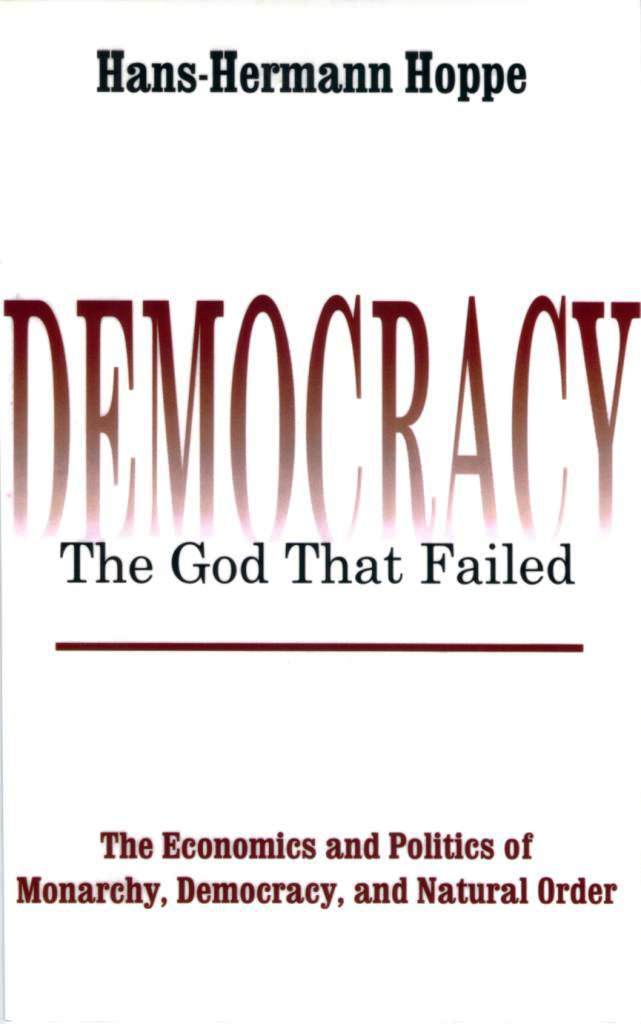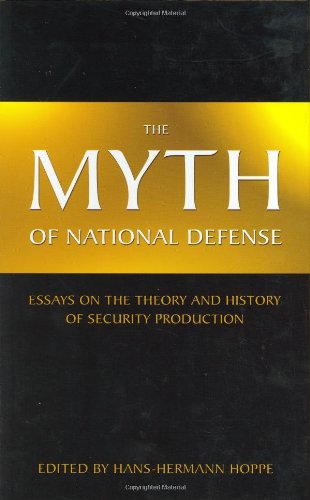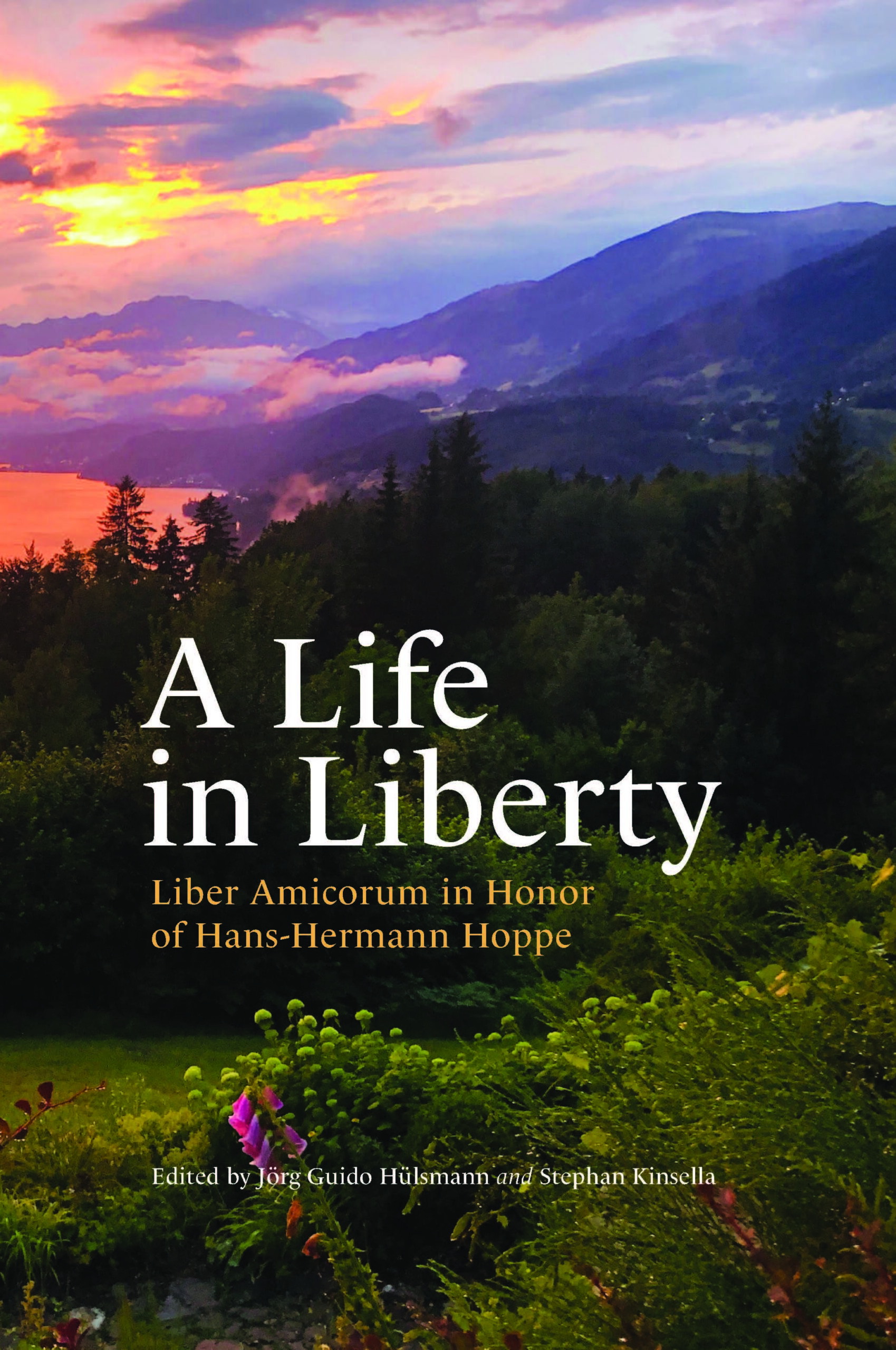 From The Diversity Con, and Other Deceptions, with Auron MacIntyre | Tom Woods Show #2688, guest Auron MacIntyre (The Total State: How Liberal Democracies Become Tyrannies, 2024) on Hoppe:
From The Diversity Con, and Other Deceptions, with Auron MacIntyre | Tom Woods Show #2688, guest Auron MacIntyre (The Total State: How Liberal Democracies Become Tyrannies, 2024) on Hoppe:
[27:32] Tom Woods: Some people’s contribution to thought is “woke is bad.” I agree—woke people are hopeless, their arguments baseless. But speculating beyond that isn’t allowed because the range of acceptable opinion is tiny, with “woke is bad” taking up most of it. You and Tucker touched on issues not even well-known enough to be third rails, like democracy’s long-term problems. You made comments, possibly derived from Hans-Hermann Hoppe, about monarchy and democracy’s incentive structures. There’s nothing wrong with discussing this, but it shocked someone. The response was pointing and shouting, no engagement, because we’re dealing with not very bright people on the far-left wing of our movement. How can you live under this system, see how impossible it is to move the needle even when most agree with you, and not question it? You can’t pinpoint who’s to blame or get anyone to listen—they just repeat slogans. What would it take for their brains to switch on?
Auron MacIntyre: The clip that got pulled was funny because I said a republic would be preferable, but that was left out of the headline to mislead followers too dumb to watch the minute-and-a-half clip. We’re not saying monarchy is better than a republic, but it’s better than the woke theocratic oligarchy we live under. These aren’t the same systems. Hoppe got this from Bertrand de Jouvenel, whose work on power everyone should read. The people defending the status quo equate love for what America was supposed to be with what we have now. If you criticize the present, they think you’re attacking the founding ideals. But what we’re doing now has nothing to do with the Constitution or how we were meant to be governed. They don’t know this because their history comes from Sean Hannity and Schoolhouse Rock, not primary sources like the Federalist Papers or Albion’s Seed. They take slogans from talk radio and bad textbooks, defending the empire thinking it’s America. They call anyone who reads beyond that a heretic, using the left’s cooties theory of history. Read the second half of Nullification—you’ll find American history, like a long essay from 1833 by a U.S. cabinet member, that explains how the republic was supposed to function.
…
[49:24] Tom Woods: I don’t like ending on a down note. I interviewed Hans-Hermann Hoppe for my print newsletter at supportinglisteners.com, exclusive to supporters. I asked him about hope, as his friend Murray Rothbard was optimistic long-term despite short-term pessimism. Hoppe struggled to share that optimism, saying he sees no victories. Can you offer a brighter approach?
Auron MacIntyre: We’re trying to win battles at a scale we can’t—hoping one election will fix everything. That’s not how it works. We’re speedrunning the Overton window. The fact that Tucker and I can have this conversation on such a platform is massive. The loudest critics are worried—they feel the system’s in trouble. Things have worsened, but people are recognizing reality and having discussions they wouldn’t before. Many are turning to faith for community and meaning to get through troubled times. Strong communities built on faith will resolve this, creating new scenarios in small pockets, not sweeping votes. You and I encourage people to better themselves and their communities, building resilient connections. Difficult times are here, but the question is whether you’ll ensure you, your family, and those around you thrive. Victories will come closer to home, and that’s an advantage if we’re serious about winning.
Full transcript below.
Introduction
[0:00]
Tom Woods: Get ready to take a flamethrower to the official narrative and learn what the elites don’t want you to know. You’re listening to the Tom Woods Show.
[0:18]
Tom Woods: Hey everybody, Tom Woods here. It’s episode 2688 of the Tom Woods Show. We’ve got our old friend Auron MacIntyre back on the program. This poor soul is trying to get out of town, and Woods ropes him into one more Tom Woods Show episode in the hour he can spare before he does that. He’s a good sport. He’s the host of the Auron MacIntyre Show on The Blaze. He’s the author of a book I keep badgering you to read called The Total State. He’s also been an attendee at one of my Christmas parties, which I’ll be announcing soon for those of you who’d like to be there. In any case, he recently had the opportunity—I’m sorry, I’m speaking about you in the third person like you’re not even here—to be on with Tucker Carlson. I want to talk about that because the kinds of issues discussed there are of great interest to us all. So, Auron, welcome back.
Auron MacIntyre: Thank you so much for having me, Tom.
Discussion on Tucker Carlson Appearance
[1:08]
Tom Woods: First of all, how did that happen? Did you get a phone call or an email? All my friends have been on Tucker Carlson, and I want to know how it works.
Auron MacIntyre: I got a text message saying, “Hey, we’re interested in booking you.” They called The Blaze and got my number. It was as simple as that.
[1:31]
Tom Woods: Good, good. I hear from a lot of people that when you talk to Tucker, you discover he’s basically just like you and me. He understands everything. That’s the impression I get from his interviews. What’s yours?
Auron MacIntyre: He’s definitely tuned in. He’s spent a lot of time in these spheres and is very aware of the mistakes he made as a younger guy. He’s focused on the fact that he backed the wrong side in many situations, including calls for war. He’s someone trying to better understand the world and how it arrived at its current position. Of course, anyone in show business for 35 years has a bit of that wrapped up in them, but ultimately, I think he’s well-grounded in what’s going on.
Tom Woods: As do I. It’s interesting that some of the people attacking him now are from social circles he once traveled in. They didn’t know the direction he’d take, but they were friendly to some degree. Even though he was on the edgy side of the establishment, he took conventional views on certain important questions. Then, suddenly, not so much anymore. The response has been to call him crazy or unhinged, counting how many times he mentions Israel. Should we count how many times someone mentions COVID? These are important issues. What difference does it make? They say he’s obsessed with Israel, but when the entire U.S. Congress repeats the same words over and over on Twitter like a ransom note, there’s no obsession there—it’s just Tucker.
Auron MacIntyre: This is obviously Tucker as a class traitor. He was in their social circles, knew all the right people. The deal is: yes, we’re left or right, but we maintain certain class interests. You wave the flag for conservatives occasionally, but we come together on key issues that keep everyone in power. With Israel, it’s clear the game being played is the same as left-wing identity politics. If you mention crime, it’s a proxy for hating Black Americans. If you note disparities in college outcomes, you’re attacking a particular race. You’re not allowed to notice, put facts on the table, or address the issues. You’re only allowed to parrot the line. The strategy isn’t to have a good-faith discussion about whether Israel’s behavior is tenable or if our relationship with them benefits us. It’s to scream “heretic” until you shut up. They can talk about Black identity all day, but the minute you mention something, you’re the problem.
Washington’s Farewell Address and Primary Sources
[5:19]
Tom Woods: I want to mention a couple of specific things you covered that I thought were significant. You talked briefly about George Washington’s Farewell Address. About half of it is of no interest to me, but the half everyone cares about is the correct half—about entangling alliances. The idea is that our country, far removed from the Old World’s conflicts, should take advantage of that rather than show favoritism to one nation, distorting our judgment and compromising our interests. Reading it feels like it’s ripped from today’s headlines. You mentioned, as an educator, having students read Washington’s Farewell Address, and a brief discussion ensued about using primary sources in classrooms, which may be declining. I can’t verify that, but I know many primary sources, like presidential inaugural addresses, are meaningless tissues of platitudes that don’t reflect the organic lived existence of Americans. My book Nullification—the second half is primary sources nobody read in school. I dug them up. Revolutionaries prefer we not steep ourselves in life before they came along because we might get uppity ideas.
Auron MacIntyre: It’s hard to explain to people who’ve only read history through curated scholastic texts how heavily edited these are. A few pictures or a diagram can completely change the context of a historical event. Primary sources are contextualized in the lives of the people living through them. It’s not just the facts, though those are important. The culture, attitude, philosophy, religion, and folkways seep into the writing. You get a different experience, helping you understand how people reasoned to their decisions. Were they dullards, or am I just superior due to chronological snobbery? Primary sources show how they valued things differently, and even if you think they’re wrong, you see it wasn’t irrational in their context. They give a wider context for events, which is dangerous for those selling the narrative that everything today is how it was always meant to be, that there are no valid alternative opinions. That’s why many don’t bother with primary texts—they’re difficult and require extra work to grasp. It’s easier to have the narrative laid out. If you read Senate debates between Robert Hayne, John C. Calhoun, and Daniel Webster, you see the degradation of American society. I’d like to find more than a handful of senators today who could even understand those speeches, let alone deliver them spontaneously.
Republic vs. Empire
[10:02]
Tom Woods: What was the overarching topic? Why were you brought on?
Auron MacIntyre: I think Tucker had interacted with my work, and others recommended it. There wasn’t a specific topic in mind, but what developed was the tension between republic and empire—whether we’re on an unavoidable collision course with the end of empire or if there’s a way back to a republican form of government. Can modern Americans even recognize what a republic is or live in one if it was available? That loops into identity, American tradition, and other necessary concepts. That was the overall theme.
Tom Woods: Twenty years ago, we didn’t discuss this because the choices were empire light or empire on steroids. There was no conversation about whether this was desirable. You had outliers like Pat Buchanan, but generally, that’s not how it went. I lived through it, and it was frustrating because none of the offered opinions were appealing. Nobody said the deck was stacked against us. The fact that you and Tucker, with his massive audience, are discussing whether this deformed version of society is desirable or if we can change it back is a novelty. We went through the entire Cold War and post-Cold War period without anyone asking, “Is this what you want?” No one was given a choice.
[12:31]
Tom Woods: [Advertisement] Let’s take a minute to thank our sponsor, Persist SEO. If you’re getting buried by competition online, build your brand, reputation, and lead flow with digital marketing by Persist SEO. If you’re a small local business competing against large companies in the service industry, increase your visibility with Persist SEO. If you have low or no leads consistently, website, search engine, and conversion optimization can move the needle to a more prosperous business model. Tired of cold calling and networking? Use your website as a lead generation engine. Not showing up for your services in search engines? Get found with Persist SEO’s expert search engine optimization. Call 770-580-3736 or visit them at ineedseo.help for a free website audit and consultation.
Costs of Empire
[13:36]
Auron MacIntyre: After the Soviet Union’s fall, people were riding high. You understand where the “end of history” narrative came from. The world was bifurcated into Soviet or American satellites, and one lost. When your identity is tied to ideology, its victory seems like the universalization of that identity. Why would it end? A few, like you and Pat Buchanan, warned against this, but it took foresight. At the time, it felt like America had conquered the world. Why not enjoy the consequences of empire? Few nations have resisted that call. It’s understandable how we got here, but now the costs of empire are too obvious. In the 1990s, with massive wealth booms and the apex of classical liberal ideas, it seemed like the final victory. Decades later, we see terrible consequences for our military, budget, economy, working class, American identity, and mass immigration. The evidence is now clear, even if suppressed by some economists claiming infinite immigration solves everything. Even liberals in New York recognize the open borders problem. The message is easier now because the consequences are obvious, not just abstract warnings.
Tom Woods: Both sides have warnings. We’ve had climate change warnings for ages, but beachfront property prices haven’t collapsed as predicted. These consequences, though, everyone can see. We’ve seen demonstrations against immigration in major countries. The non-left isn’t naturally into organizing marches—it’s not their thing. Even if they have a big demonstration, support is likely greater because many, like me, hate marching but cheer for them. Left-wing demonstrations probably represent their entire base, but for us, it’s just the tip. The Overton window is opening—people feel they can say, “I want a home with people I don’t need to explain myself to, with mutual understandings and compatible traditions.” That’s instinctive, and arguing against it feels pointless, like debating transgenderism. I’m not up against people of goodwill ready to debate—I’m up against those who want to destroy everything good. The time for college term papers is past; it’s about saving something precious, regardless of nasty names.
Auron MacIntyre: Philosopher Nick Land, in The Dark Enlightenment, says democracy is inherently left-wing because public debate always moves left. The right perishes by dialectics; the left flourishes. The right is built on nature’s axioms—God’s law, natural hierarchy, self-evident truths like male and female, the family’s importance, or a society’s right to turn away outsiders. You don’t debate these; they’re foundational, experienced in life. Long-winded sophistry sessions just lead to left-wing opinions and name-calling. There’s no discussion, only action. Getting 5,000 leftists to demonstrate is easy; for the right, it takes something serious. When 5,000 right-wingers hit the streets, problems are so bad there’s no other choice, and 500,000 are likely cheering them on.
The Concept of Diversity
[21:27]
Tom Woods: Let’s introduce the word “diversity.” We’re tired of hearing it—it’s a propaganda word. I don’t want to use it or claim I’m the “real” version of it. I build my own terms, not parasite off left-wing language. But there’s a sense in which this is about diversity. When I go to Japan, I want to see Japanese people, not Mario serving lasagna or bagpipes playing. I want Japan to be Japanese because its culture comes from its people. When malicious people say Japan needs more unlike itself, they’re not wishing it well. I’d take Japan’s “lost decades” for a society that works like theirs in a heartbeat. Can you describe what you, Auron MacIntyre, want, using the word “diversity” for this brief moment?
Auron MacIntyre: I want the order God created, which is one of nations. The Bible is clear—nations exist, and melding them into one is against God’s will. He scattered them for a reason. In Revelation, nations persist. God’s plan isn’t a unified world government; He struck one down. We want diversity of peoples, but that requires different peoples in different places, not all mixed together living the same way. That creates homogeneity. If Epcot was just America-land, it’d be boring. Each culture provides something unique. Forcing different cultures together destroys the majority culture, importing a new one. The left knows this—they’d be angry if you suggested more white Europeans in South Africa or Rhodesia. Israel keeps its population majority Jewish to maintain its identity, and that’s fine. All peoples want the same—to protect their identities. Without that, we lose the diversity of nations.
[25:51]
Tom Woods: [Advertisement] If you care about liberty and financial freedom, you need Matthew Cersley, a tax attorney who hates the tax man as much as I do. He uses his 826 IQ points to help liberty-minded folks keep more money and stay out of IRS trouble. Your conversations with him are protected by attorney-client privilege, unlike with a CPA. He’s one of us—attending my Nashville murder mystery party, my cruise, and listening to the Tom Woods Show since episode 3. He’s a member of my elite mastermind. Matthew builds strategies to legally starve the state—entity structuring, income shifting, advanced planning. Visit agoristtaxadvice.com/woods for a free Agorist tax toolkit with tools and templates to reduce your tax burden legally.
Critiquing Ideology and Democracy
[27:32]
Tom Woods: Some people’s contribution to thought is “woke is bad.” I agree—woke people are hopeless, their arguments baseless. But speculating beyond that isn’t allowed because the range of acceptable opinion is tiny, with “woke is bad” taking up most of it. You and Tucker touched on issues not even well-known enough to be third rails, like democracy’s long-term problems. You made comments, possibly derived from Hans-Hermann Hoppe, about monarchy and democracy’s incentive structures. There’s nothing wrong with discussing this, but it shocked someone. The response was pointing and shouting, no engagement, because we’re dealing with not very bright people on the far-left wing of our movement. How can you live under this system, see how impossible it is to move the needle even when most agree with you, and not question it? You can’t pinpoint who’s to blame or get anyone to listen—they just repeat slogans. What would it take for their brains to switch on?
Auron MacIntyre: The clip that got pulled was funny because I said a republic would be preferable, but that was left out of the headline to mislead followers too dumb to watch the minute-and-a-half clip. We’re not saying monarchy is better than a republic, but it’s better than the woke theocratic oligarchy we live under. These aren’t the same systems. Hoppe got this from Bertrand de Jouvenel, whose work on power everyone should read. The people defending the status quo equate love for what America was supposed to be with what we have now. If you criticize the present, they think you’re attacking the founding ideals. But what we’re doing now has nothing to do with the Constitution or how we were meant to be governed. They don’t know this because their history comes from Sean Hannity and Schoolhouse Rock, not primary sources like the Federalist Papers or Albion’s Seed. They take slogans from talk radio and bad textbooks, defending the empire thinking it’s America. They call anyone who reads beyond that a heretic, using the left’s cooties theory of history. Read the second half of Nullification—you’ll find American history, like a long essay from 1833 by a U.S. cabinet member, that explains how the republic was supposed to function.
Tom Woods: I love the American tradition, but I’m willing to think beyond it for fun. One problem with the woke oligarchy is they don’t get hurt like Budweiser or Cracker Barrel does when they go woke. They don’t own the U.S.—there are no shareholders. They can turn the country against itself, consume its capital, and make irrational decisions because they don’t care about long-term value. A monarch, though, has a stake in preserving the country for their heir, not handing over a mess. That’s an interesting thought—maybe dumb, but it doesn’t deserve dismissal. The lack of curiosity among those policing our movement is frustrating. They’re satisfied with five ideas, while I want broader conversations, even if I’m wrong, because at least I won’t be boring.
Auron MacIntyre: We’re slaves to ideology, as you know from the libertarian movement. When your identity is a propositional nation or libertarianism, any attack on that ideology feels like an attack on you. You can’t suggest monarchy’s benefits because their identity is tied to defeating it. When identity is wrapped in systems, pointing out flaws or competing advantages feels like a personal attack. The friend-enemy distinction matters—people care about protecting their identity, whether ideological, religious, or racial. You can tell someone’s bedrock belief when they lose their mind over a topic. That instinct is natural and good when in the right place, but when tied to ideology, it shuts down discussion. Touching that ideology unspools their identity, triggering a fight response.
Tom Woods: That’s hard for me and my listeners to hear because, bluntly, we think we’re right about everything. Admitting another system has insights we’ve missed requires humility we often lack. I want to introduce something. Years ago, I became interested in the American right post-World War II—its personalities, institutions, ideas, and debates. There was a debate in Modern Age, founded by Russell Kirk in 1957, between Harry Jaffa and Emmy Bradford over equality. Jaffa wrote “Equality as a Conservative Principle,” and Bradford responded with “Equality as a Heresy,” calling it the antonym of every conservative instinct. They hashed it out at a high level, showing the movement’s caliber 45 years ago. Bradford argued that meshing equality with Lincoln’s idea of the U.S. as dedicated to a proposition turns the federal government into an equality enforcement mechanism, requiring PhDs to dictate everything. It never stops, consuming every nook of society. Jaffa opposed gay rights, but equality steamrolled him, as Bradford predicted. Recently, a critic on Twitter called you and others “woke right” for questioning “all men are created equal,” claiming it’s a heresy you dare not debate. But Jaffa versus Bradford was the most important conservative debate on this exact issue.
[45:29]
Tom Woods: [Advertisement] From October 10th to 12th, Mikkel Thorup, host of the Expat Money Show and a Tom Woods Show guest, is hosting the Expat Money online summit, free to attend. Learn how to protect wealth, secure residencies and citizenships, reduce taxes, and own property abroad. This year’s focus is Latin America, with Argentina shifting to free markets, El Salvador transforming, and Panama and Paraguay offering residency programs. A Plan B is essential. Reserve your free ticket at expatmoneysummit.com.
Auron MacIntyre: John C. Calhoun wrote a treatise on why “all men are created equal” isn’t correct. This has been debated robustly in American history. Look at what Lincoln actually thought about the slaves he freed—he didn’t believe he could live side by side with them. Even his version of equality isn’t what people think. People throw terms around without historical context, never reading primary sources. When the founders said “all men are created equal,” they knew it wasn’t evident to people in China. They meant equal before God in their tradition, not making everyone equal on Earth. The levelers’ impulse isn’t new, but once equality becomes your core identity, it erodes everything. I’m fine with equality under the law for American citizens with generational history here, but ensuring every institution produces the same outcome for every group is a natural growth of that ideology. Even conservatives arguing against it don’t understand its historical context.
Hope for the Future
[49:24]
Tom Woods: I don’t like ending on a down note. I interviewed Hans-Hermann Hoppe for my print newsletter at supportinglisteners.com, exclusive to supporters. I asked him about hope, as his friend Murray Rothbard was optimistic long-term despite short-term pessimism. Hoppe struggled to share that optimism, saying he sees no victories. Can you offer a brighter approach?
Auron MacIntyre: We’re trying to win battles at a scale we can’t—hoping one election will fix everything. That’s not how it works. We’re speedrunning the Overton window. The fact that Tucker and I can have this conversation on such a platform is massive. The loudest critics are worried—they feel the system’s in trouble. Things have worsened, but people are recognizing reality and having discussions they wouldn’t before. Many are turning to faith for community and meaning to get through troubled times. Strong communities built on faith will resolve this, creating new scenarios in small pockets, not sweeping votes. You and I encourage people to better themselves and their communities, building resilient connections. Difficult times are here, but the question is whether you’ll ensure you, your family, and those around you thrive. Victories will come closer to home, and that’s an advantage if we’re serious about winning.
Closing
[53:02]
Tom Woods: What’s a link for the Auron MacIntyre world?
Auron MacIntyre: My website, auronmacintyre.com, links to YouTube, Rumble, the podcast, the book, and social media. That’s A-U-R-O-N M-A-C-I-N-T-Y-R-E.
Tom Woods: I’ll also have links at tomwoods.com/2688. Safe travels, my friend. Thanks for your time.
Auron MacIntyre: Thanks for having me.
Tom Woods: Thank you, ladies and gentlemen. Don’t forget to join me on the 2026 Tom Woods Cruise at tomwoodscruise.com. See you next time. Make yourself and those you love less vulnerable to the regime, mentally and physically. Get more forbidden information at tomsfreebooks.com. Subscribe to the show wherever you listen.
[54:18]
Tom Woods: Like the sound of the Tom Woods Show? My audio production is provided by Podsworth Media. Check them out at podsworth.com.











